Entrepreneurship and Small Business Management: Impact on UK Economy
VerifiedAdded on 2022/12/15
|16
|5154
|53
Report
AI Summary
This report provides an overview of entrepreneurship and small business management, focusing on the impact of micro and small businesses on the UK economy. It examines different types of entrepreneurial ventures and their typologies, highlighting the similarities and differences between them. The report uses data and statistics to illustrate the significant role of micro and small businesses in the UK economy, emphasizing their contribution to job creation and economic growth. It also discusses the importance of small businesses and start-ups in fostering social economy. Furthermore, the report explores the characteristic traits and skills of successful entrepreneurs, and how entrepreneurial personalities reflect motivation and mindset. Finally, it uses examples to illustrate how background and experience can either hinder or foster entrepreneurship. The document is available on Desklib, a platform offering study tools and resources for students.

Entrepreneurship and Small
Business Management
Business Management
Paraphrase This Document
Need a fresh take? Get an instant paraphrase of this document with our AI Paraphraser
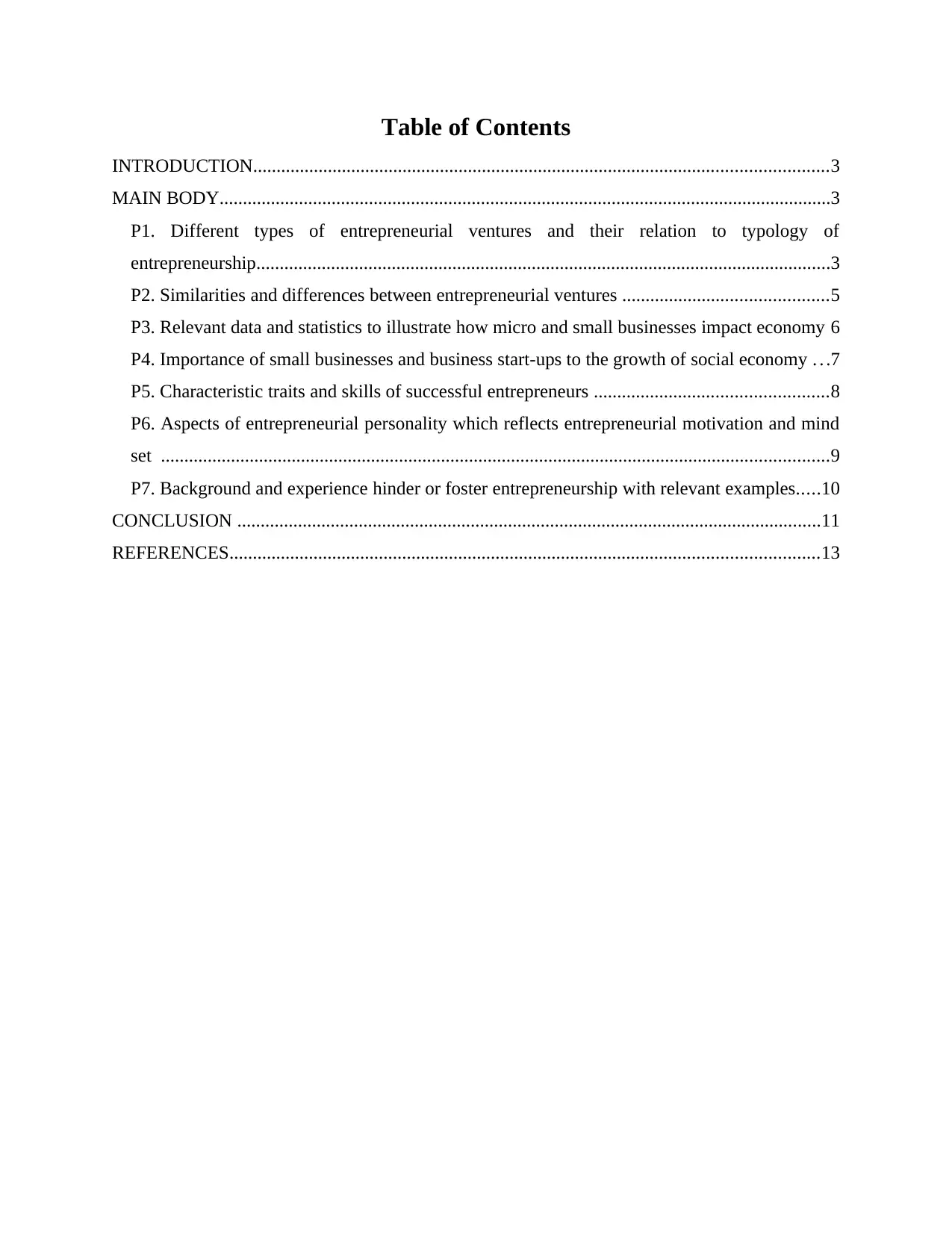
Table of Contents
INTRODUCTION...........................................................................................................................3
MAIN BODY...................................................................................................................................3
P1. Different types of entrepreneurial ventures and their relation to typology of
entrepreneurship...........................................................................................................................3
P2. Similarities and differences between entrepreneurial ventures ............................................5
P3. Relevant data and statistics to illustrate how micro and small businesses impact economy 6
P4. Importance of small businesses and business start-ups to the growth of social economy . . .7
P5. Characteristic traits and skills of successful entrepreneurs ..................................................8
P6. Aspects of entrepreneurial personality which reflects entrepreneurial motivation and mind
set ...............................................................................................................................................9
P7. Background and experience hinder or foster entrepreneurship with relevant examples.....10
CONCLUSION .............................................................................................................................11
REFERENCES..............................................................................................................................13
INTRODUCTION...........................................................................................................................3
MAIN BODY...................................................................................................................................3
P1. Different types of entrepreneurial ventures and their relation to typology of
entrepreneurship...........................................................................................................................3
P2. Similarities and differences between entrepreneurial ventures ............................................5
P3. Relevant data and statistics to illustrate how micro and small businesses impact economy 6
P4. Importance of small businesses and business start-ups to the growth of social economy . . .7
P5. Characteristic traits and skills of successful entrepreneurs ..................................................8
P6. Aspects of entrepreneurial personality which reflects entrepreneurial motivation and mind
set ...............................................................................................................................................9
P7. Background and experience hinder or foster entrepreneurship with relevant examples.....10
CONCLUSION .............................................................................................................................11
REFERENCES..............................................................................................................................13
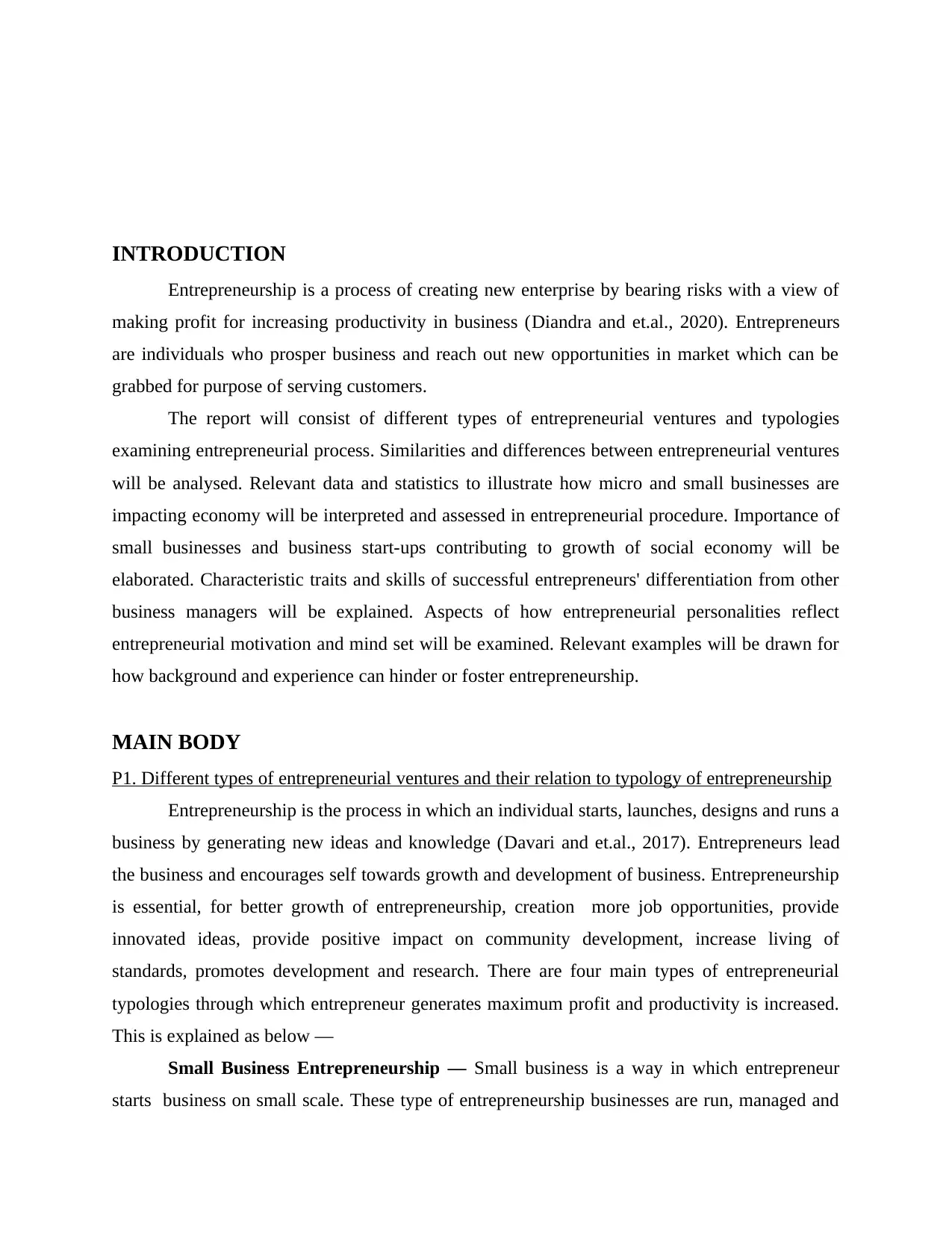
INTRODUCTION
Entrepreneurship is a process of creating new enterprise by bearing risks with a view of
making profit for increasing productivity in business (Diandra and et.al., 2020). Entrepreneurs
are individuals who prosper business and reach out new opportunities in market which can be
grabbed for purpose of serving customers.
The report will consist of different types of entrepreneurial ventures and typologies
examining entrepreneurial process. Similarities and differences between entrepreneurial ventures
will be analysed. Relevant data and statistics to illustrate how micro and small businesses are
impacting economy will be interpreted and assessed in entrepreneurial procedure. Importance of
small businesses and business start-ups contributing to growth of social economy will be
elaborated. Characteristic traits and skills of successful entrepreneurs' differentiation from other
business managers will be explained. Aspects of how entrepreneurial personalities reflect
entrepreneurial motivation and mind set will be examined. Relevant examples will be drawn for
how background and experience can hinder or foster entrepreneurship.
MAIN BODY
P1. Different types of entrepreneurial ventures and their relation to typology of entrepreneurship
Entrepreneurship is the process in which an individual starts, launches, designs and runs a
business by generating new ideas and knowledge (Davari and et.al., 2017). Entrepreneurs lead
the business and encourages self towards growth and development of business. Entrepreneurship
is essential, for better growth of entrepreneurship, creation more job opportunities, provide
innovated ideas, provide positive impact on community development, increase living of
standards, promotes development and research. There are four main types of entrepreneurial
typologies through which entrepreneur generates maximum profit and productivity is increased.
This is explained as below —
Small Business Entrepreneurship — Small business is a way in which entrepreneur
starts business on small scale. These type of entrepreneurship businesses are run, managed and
Entrepreneurship is a process of creating new enterprise by bearing risks with a view of
making profit for increasing productivity in business (Diandra and et.al., 2020). Entrepreneurs
are individuals who prosper business and reach out new opportunities in market which can be
grabbed for purpose of serving customers.
The report will consist of different types of entrepreneurial ventures and typologies
examining entrepreneurial process. Similarities and differences between entrepreneurial ventures
will be analysed. Relevant data and statistics to illustrate how micro and small businesses are
impacting economy will be interpreted and assessed in entrepreneurial procedure. Importance of
small businesses and business start-ups contributing to growth of social economy will be
elaborated. Characteristic traits and skills of successful entrepreneurs' differentiation from other
business managers will be explained. Aspects of how entrepreneurial personalities reflect
entrepreneurial motivation and mind set will be examined. Relevant examples will be drawn for
how background and experience can hinder or foster entrepreneurship.
MAIN BODY
P1. Different types of entrepreneurial ventures and their relation to typology of entrepreneurship
Entrepreneurship is the process in which an individual starts, launches, designs and runs a
business by generating new ideas and knowledge (Davari and et.al., 2017). Entrepreneurs lead
the business and encourages self towards growth and development of business. Entrepreneurship
is essential, for better growth of entrepreneurship, creation more job opportunities, provide
innovated ideas, provide positive impact on community development, increase living of
standards, promotes development and research. There are four main types of entrepreneurial
typologies through which entrepreneur generates maximum profit and productivity is increased.
This is explained as below —
Small Business Entrepreneurship — Small business is a way in which entrepreneur
starts business on small scale. These type of entrepreneurship businesses are run, managed and
⊘ This is a preview!⊘
Do you want full access?
Subscribe today to unlock all pages.

Trusted by 1+ million students worldwide
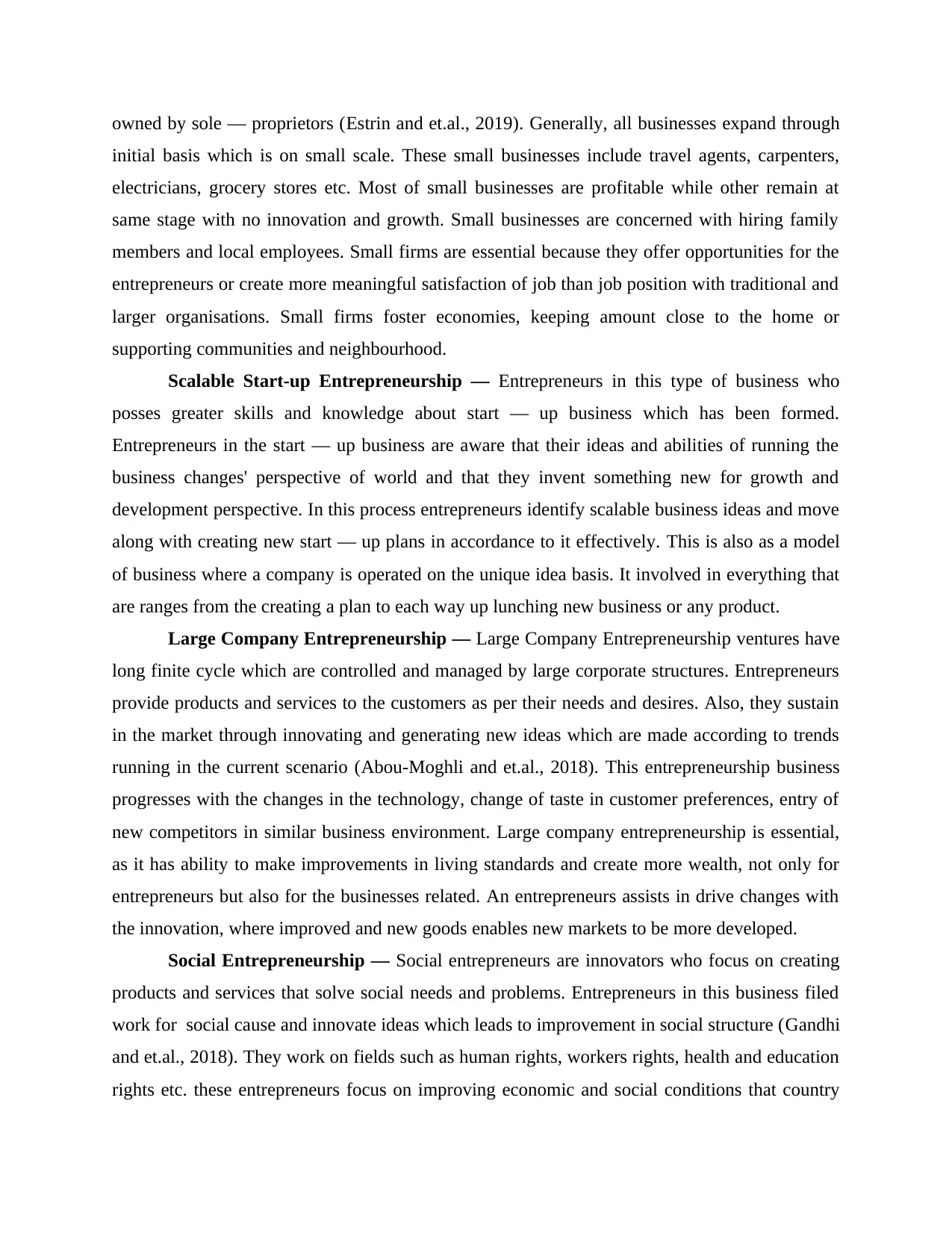
owned by sole — proprietors (Estrin and et.al., 2019). Generally, all businesses expand through
initial basis which is on small scale. These small businesses include travel agents, carpenters,
electricians, grocery stores etc. Most of small businesses are profitable while other remain at
same stage with no innovation and growth. Small businesses are concerned with hiring family
members and local employees. Small firms are essential because they offer opportunities for the
entrepreneurs or create more meaningful satisfaction of job than job position with traditional and
larger organisations. Small firms foster economies, keeping amount close to the home or
supporting communities and neighbourhood.
Scalable Start-up Entrepreneurship — Entrepreneurs in this type of business who
posses greater skills and knowledge about start — up business which has been formed.
Entrepreneurs in the start — up business are aware that their ideas and abilities of running the
business changes' perspective of world and that they invent something new for growth and
development perspective. In this process entrepreneurs identify scalable business ideas and move
along with creating new start — up plans in accordance to it effectively. This is also as a model
of business where a company is operated on the unique idea basis. It involved in everything that
are ranges from the creating a plan to each way up lunching new business or any product.
Large Company Entrepreneurship — Large Company Entrepreneurship ventures have
long finite cycle which are controlled and managed by large corporate structures. Entrepreneurs
provide products and services to the customers as per their needs and desires. Also, they sustain
in the market through innovating and generating new ideas which are made according to trends
running in the current scenario (Abou-Moghli and et.al., 2018). This entrepreneurship business
progresses with the changes in the technology, change of taste in customer preferences, entry of
new competitors in similar business environment. Large company entrepreneurship is essential,
as it has ability to make improvements in living standards and create more wealth, not only for
entrepreneurs but also for the businesses related. An entrepreneurs assists in drive changes with
the innovation, where improved and new goods enables new markets to be more developed.
Social Entrepreneurship — Social entrepreneurs are innovators who focus on creating
products and services that solve social needs and problems. Entrepreneurs in this business filed
work for social cause and innovate ideas which leads to improvement in social structure (Gandhi
and et.al., 2018). They work on fields such as human rights, workers rights, health and education
rights etc. these entrepreneurs focus on improving economic and social conditions that country
initial basis which is on small scale. These small businesses include travel agents, carpenters,
electricians, grocery stores etc. Most of small businesses are profitable while other remain at
same stage with no innovation and growth. Small businesses are concerned with hiring family
members and local employees. Small firms are essential because they offer opportunities for the
entrepreneurs or create more meaningful satisfaction of job than job position with traditional and
larger organisations. Small firms foster economies, keeping amount close to the home or
supporting communities and neighbourhood.
Scalable Start-up Entrepreneurship — Entrepreneurs in this type of business who
posses greater skills and knowledge about start — up business which has been formed.
Entrepreneurs in the start — up business are aware that their ideas and abilities of running the
business changes' perspective of world and that they invent something new for growth and
development perspective. In this process entrepreneurs identify scalable business ideas and move
along with creating new start — up plans in accordance to it effectively. This is also as a model
of business where a company is operated on the unique idea basis. It involved in everything that
are ranges from the creating a plan to each way up lunching new business or any product.
Large Company Entrepreneurship — Large Company Entrepreneurship ventures have
long finite cycle which are controlled and managed by large corporate structures. Entrepreneurs
provide products and services to the customers as per their needs and desires. Also, they sustain
in the market through innovating and generating new ideas which are made according to trends
running in the current scenario (Abou-Moghli and et.al., 2018). This entrepreneurship business
progresses with the changes in the technology, change of taste in customer preferences, entry of
new competitors in similar business environment. Large company entrepreneurship is essential,
as it has ability to make improvements in living standards and create more wealth, not only for
entrepreneurs but also for the businesses related. An entrepreneurs assists in drive changes with
the innovation, where improved and new goods enables new markets to be more developed.
Social Entrepreneurship — Social entrepreneurs are innovators who focus on creating
products and services that solve social needs and problems. Entrepreneurs in this business filed
work for social cause and innovate ideas which leads to improvement in social structure (Gandhi
and et.al., 2018). They work on fields such as human rights, workers rights, health and education
rights etc. these entrepreneurs focus on improving economic and social conditions that country
Paraphrase This Document
Need a fresh take? Get an instant paraphrase of this document with our AI Paraphraser
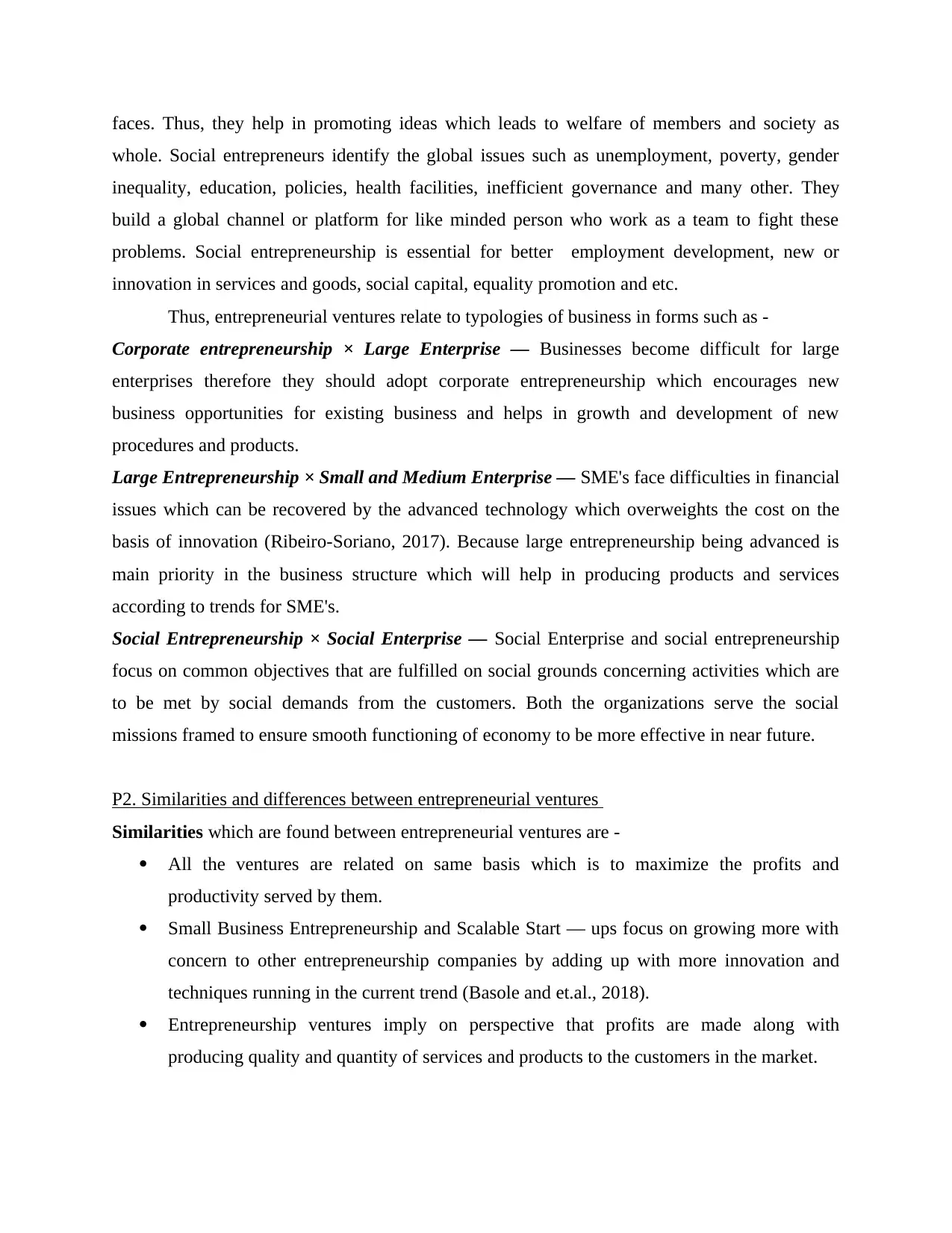
faces. Thus, they help in promoting ideas which leads to welfare of members and society as
whole. Social entrepreneurs identify the global issues such as unemployment, poverty, gender
inequality, education, policies, health facilities, inefficient governance and many other. They
build a global channel or platform for like minded person who work as a team to fight these
problems. Social entrepreneurship is essential for better employment development, new or
innovation in services and goods, social capital, equality promotion and etc.
Thus, entrepreneurial ventures relate to typologies of business in forms such as -
Corporate entrepreneurship × Large Enterprise — Businesses become difficult for large
enterprises therefore they should adopt corporate entrepreneurship which encourages new
business opportunities for existing business and helps in growth and development of new
procedures and products.
Large Entrepreneurship × Small and Medium Enterprise — SME's face difficulties in financial
issues which can be recovered by the advanced technology which overweights the cost on the
basis of innovation (Ribeiro-Soriano, 2017). Because large entrepreneurship being advanced is
main priority in the business structure which will help in producing products and services
according to trends for SME's.
Social Entrepreneurship × Social Enterprise — Social Enterprise and social entrepreneurship
focus on common objectives that are fulfilled on social grounds concerning activities which are
to be met by social demands from the customers. Both the organizations serve the social
missions framed to ensure smooth functioning of economy to be more effective in near future.
P2. Similarities and differences between entrepreneurial ventures
Similarities which are found between entrepreneurial ventures are -
All the ventures are related on same basis which is to maximize the profits and
productivity served by them.
Small Business Entrepreneurship and Scalable Start — ups focus on growing more with
concern to other entrepreneurship companies by adding up with more innovation and
techniques running in the current trend (Basole and et.al., 2018).
Entrepreneurship ventures imply on perspective that profits are made along with
producing quality and quantity of services and products to the customers in the market.
whole. Social entrepreneurs identify the global issues such as unemployment, poverty, gender
inequality, education, policies, health facilities, inefficient governance and many other. They
build a global channel or platform for like minded person who work as a team to fight these
problems. Social entrepreneurship is essential for better employment development, new or
innovation in services and goods, social capital, equality promotion and etc.
Thus, entrepreneurial ventures relate to typologies of business in forms such as -
Corporate entrepreneurship × Large Enterprise — Businesses become difficult for large
enterprises therefore they should adopt corporate entrepreneurship which encourages new
business opportunities for existing business and helps in growth and development of new
procedures and products.
Large Entrepreneurship × Small and Medium Enterprise — SME's face difficulties in financial
issues which can be recovered by the advanced technology which overweights the cost on the
basis of innovation (Ribeiro-Soriano, 2017). Because large entrepreneurship being advanced is
main priority in the business structure which will help in producing products and services
according to trends for SME's.
Social Entrepreneurship × Social Enterprise — Social Enterprise and social entrepreneurship
focus on common objectives that are fulfilled on social grounds concerning activities which are
to be met by social demands from the customers. Both the organizations serve the social
missions framed to ensure smooth functioning of economy to be more effective in near future.
P2. Similarities and differences between entrepreneurial ventures
Similarities which are found between entrepreneurial ventures are -
All the ventures are related on same basis which is to maximize the profits and
productivity served by them.
Small Business Entrepreneurship and Scalable Start — ups focus on growing more with
concern to other entrepreneurship companies by adding up with more innovation and
techniques running in the current trend (Basole and et.al., 2018).
Entrepreneurship ventures imply on perspective that profits are made along with
producing quality and quantity of services and products to the customers in the market.
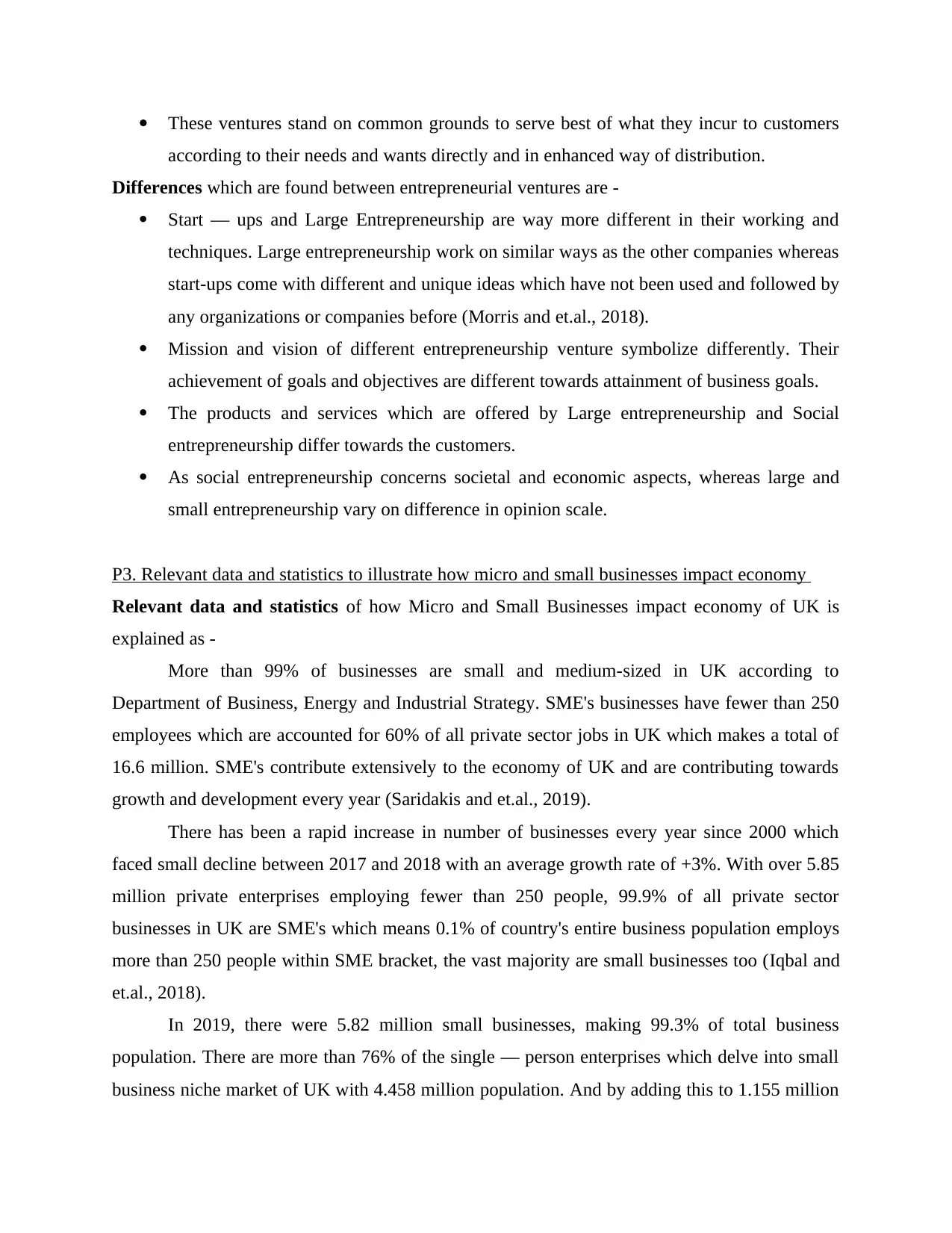
These ventures stand on common grounds to serve best of what they incur to customers
according to their needs and wants directly and in enhanced way of distribution.
Differences which are found between entrepreneurial ventures are -
Start — ups and Large Entrepreneurship are way more different in their working and
techniques. Large entrepreneurship work on similar ways as the other companies whereas
start-ups come with different and unique ideas which have not been used and followed by
any organizations or companies before (Morris and et.al., 2018).
Mission and vision of different entrepreneurship venture symbolize differently. Their
achievement of goals and objectives are different towards attainment of business goals.
The products and services which are offered by Large entrepreneurship and Social
entrepreneurship differ towards the customers.
As social entrepreneurship concerns societal and economic aspects, whereas large and
small entrepreneurship vary on difference in opinion scale.
P3. Relevant data and statistics to illustrate how micro and small businesses impact economy
Relevant data and statistics of how Micro and Small Businesses impact economy of UK is
explained as -
More than 99% of businesses are small and medium-sized in UK according to
Department of Business, Energy and Industrial Strategy. SME's businesses have fewer than 250
employees which are accounted for 60% of all private sector jobs in UK which makes a total of
16.6 million. SME's contribute extensively to the economy of UK and are contributing towards
growth and development every year (Saridakis and et.al., 2019).
There has been a rapid increase in number of businesses every year since 2000 which
faced small decline between 2017 and 2018 with an average growth rate of +3%. With over 5.85
million private enterprises employing fewer than 250 people, 99.9% of all private sector
businesses in UK are SME's which means 0.1% of country's entire business population employs
more than 250 people within SME bracket, the vast majority are small businesses too (Iqbal and
et.al., 2018).
In 2019, there were 5.82 million small businesses, making 99.3% of total business
population. There are more than 76% of the single — person enterprises which delve into small
business niche market of UK with 4.458 million population. And by adding this to 1.155 million
according to their needs and wants directly and in enhanced way of distribution.
Differences which are found between entrepreneurial ventures are -
Start — ups and Large Entrepreneurship are way more different in their working and
techniques. Large entrepreneurship work on similar ways as the other companies whereas
start-ups come with different and unique ideas which have not been used and followed by
any organizations or companies before (Morris and et.al., 2018).
Mission and vision of different entrepreneurship venture symbolize differently. Their
achievement of goals and objectives are different towards attainment of business goals.
The products and services which are offered by Large entrepreneurship and Social
entrepreneurship differ towards the customers.
As social entrepreneurship concerns societal and economic aspects, whereas large and
small entrepreneurship vary on difference in opinion scale.
P3. Relevant data and statistics to illustrate how micro and small businesses impact economy
Relevant data and statistics of how Micro and Small Businesses impact economy of UK is
explained as -
More than 99% of businesses are small and medium-sized in UK according to
Department of Business, Energy and Industrial Strategy. SME's businesses have fewer than 250
employees which are accounted for 60% of all private sector jobs in UK which makes a total of
16.6 million. SME's contribute extensively to the economy of UK and are contributing towards
growth and development every year (Saridakis and et.al., 2019).
There has been a rapid increase in number of businesses every year since 2000 which
faced small decline between 2017 and 2018 with an average growth rate of +3%. With over 5.85
million private enterprises employing fewer than 250 people, 99.9% of all private sector
businesses in UK are SME's which means 0.1% of country's entire business population employs
more than 250 people within SME bracket, the vast majority are small businesses too (Iqbal and
et.al., 2018).
In 2019, there were 5.82 million small businesses, making 99.3% of total business
population. There are more than 76% of the single — person enterprises which delve into small
business niche market of UK with 4.458 million population. And by adding this to 1.155 million
⊘ This is a preview!⊘
Do you want full access?
Subscribe today to unlock all pages.

Trusted by 1+ million students worldwide
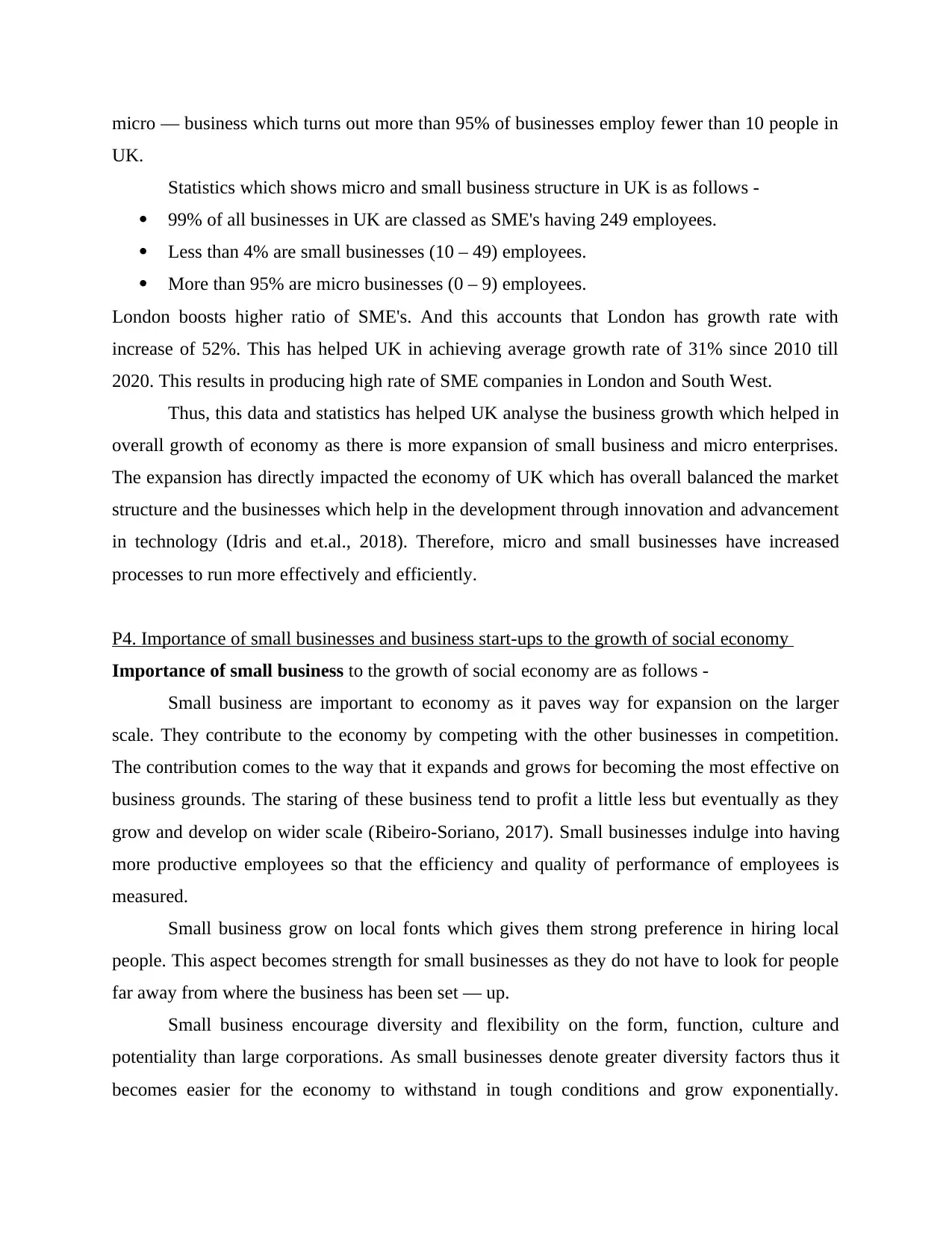
micro — business which turns out more than 95% of businesses employ fewer than 10 people in
UK.
Statistics which shows micro and small business structure in UK is as follows -
99% of all businesses in UK are classed as SME's having 249 employees.
Less than 4% are small businesses (10 – 49) employees.
More than 95% are micro businesses (0 – 9) employees.
London boosts higher ratio of SME's. And this accounts that London has growth rate with
increase of 52%. This has helped UK in achieving average growth rate of 31% since 2010 till
2020. This results in producing high rate of SME companies in London and South West.
Thus, this data and statistics has helped UK analyse the business growth which helped in
overall growth of economy as there is more expansion of small business and micro enterprises.
The expansion has directly impacted the economy of UK which has overall balanced the market
structure and the businesses which help in the development through innovation and advancement
in technology (Idris and et.al., 2018). Therefore, micro and small businesses have increased
processes to run more effectively and efficiently.
P4. Importance of small businesses and business start-ups to the growth of social economy
Importance of small business to the growth of social economy are as follows -
Small business are important to economy as it paves way for expansion on the larger
scale. They contribute to the economy by competing with the other businesses in competition.
The contribution comes to the way that it expands and grows for becoming the most effective on
business grounds. The staring of these business tend to profit a little less but eventually as they
grow and develop on wider scale (Ribeiro-Soriano, 2017). Small businesses indulge into having
more productive employees so that the efficiency and quality of performance of employees is
measured.
Small business grow on local fonts which gives them strong preference in hiring local
people. This aspect becomes strength for small businesses as they do not have to look for people
far away from where the business has been set — up.
Small business encourage diversity and flexibility on the form, function, culture and
potentiality than large corporations. As small businesses denote greater diversity factors thus it
becomes easier for the economy to withstand in tough conditions and grow exponentially.
UK.
Statistics which shows micro and small business structure in UK is as follows -
99% of all businesses in UK are classed as SME's having 249 employees.
Less than 4% are small businesses (10 – 49) employees.
More than 95% are micro businesses (0 – 9) employees.
London boosts higher ratio of SME's. And this accounts that London has growth rate with
increase of 52%. This has helped UK in achieving average growth rate of 31% since 2010 till
2020. This results in producing high rate of SME companies in London and South West.
Thus, this data and statistics has helped UK analyse the business growth which helped in
overall growth of economy as there is more expansion of small business and micro enterprises.
The expansion has directly impacted the economy of UK which has overall balanced the market
structure and the businesses which help in the development through innovation and advancement
in technology (Idris and et.al., 2018). Therefore, micro and small businesses have increased
processes to run more effectively and efficiently.
P4. Importance of small businesses and business start-ups to the growth of social economy
Importance of small business to the growth of social economy are as follows -
Small business are important to economy as it paves way for expansion on the larger
scale. They contribute to the economy by competing with the other businesses in competition.
The contribution comes to the way that it expands and grows for becoming the most effective on
business grounds. The staring of these business tend to profit a little less but eventually as they
grow and develop on wider scale (Ribeiro-Soriano, 2017). Small businesses indulge into having
more productive employees so that the efficiency and quality of performance of employees is
measured.
Small business grow on local fonts which gives them strong preference in hiring local
people. This aspect becomes strength for small businesses as they do not have to look for people
far away from where the business has been set — up.
Small business encourage diversity and flexibility on the form, function, culture and
potentiality than large corporations. As small businesses denote greater diversity factors thus it
becomes easier for the economy to withstand in tough conditions and grow exponentially.
Paraphrase This Document
Need a fresh take? Get an instant paraphrase of this document with our AI Paraphraser
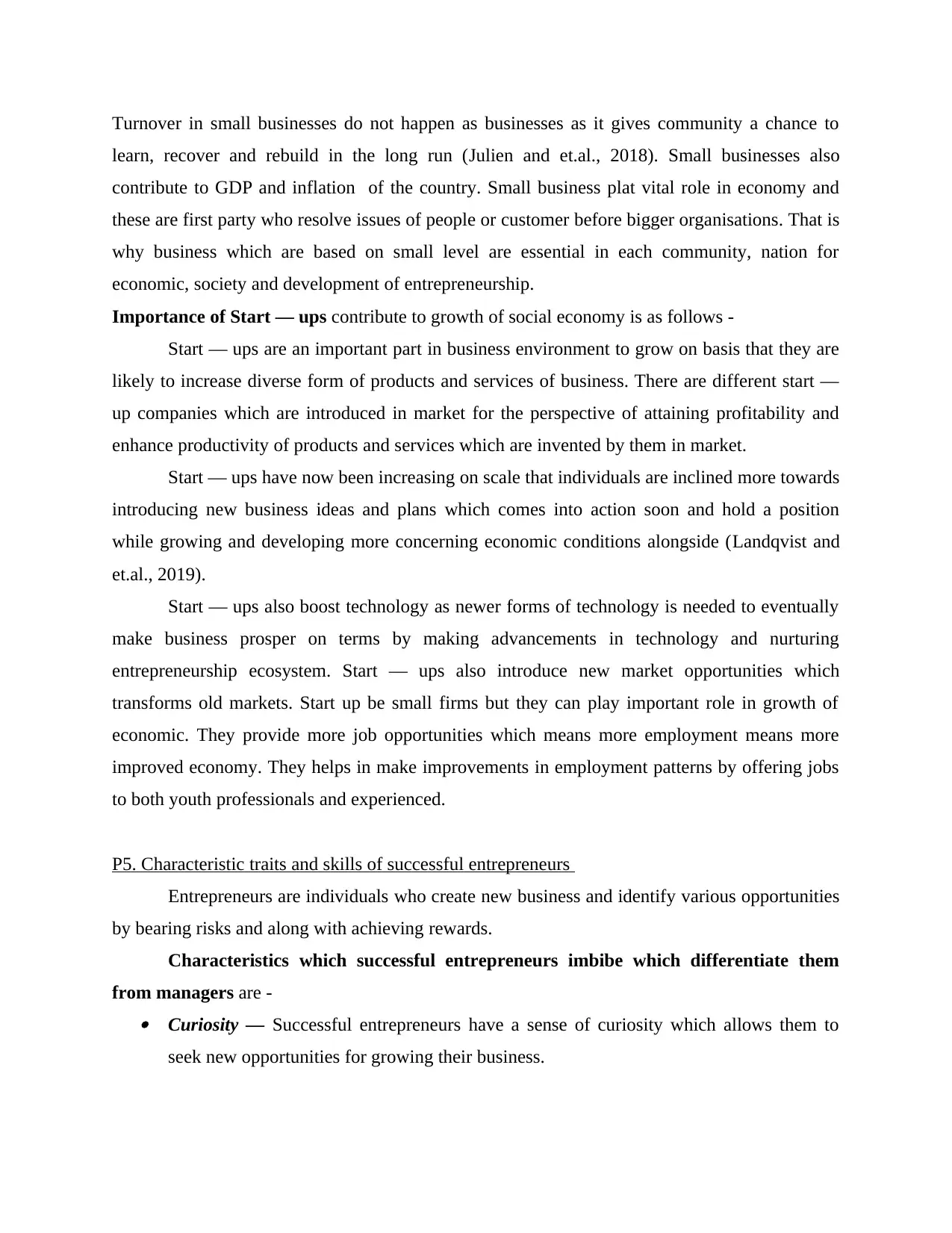
Turnover in small businesses do not happen as businesses as it gives community a chance to
learn, recover and rebuild in the long run (Julien and et.al., 2018). Small businesses also
contribute to GDP and inflation of the country. Small business plat vital role in economy and
these are first party who resolve issues of people or customer before bigger organisations. That is
why business which are based on small level are essential in each community, nation for
economic, society and development of entrepreneurship.
Importance of Start — ups contribute to growth of social economy is as follows -
Start — ups are an important part in business environment to grow on basis that they are
likely to increase diverse form of products and services of business. There are different start —
up companies which are introduced in market for the perspective of attaining profitability and
enhance productivity of products and services which are invented by them in market.
Start — ups have now been increasing on scale that individuals are inclined more towards
introducing new business ideas and plans which comes into action soon and hold a position
while growing and developing more concerning economic conditions alongside (Landqvist and
et.al., 2019).
Start — ups also boost technology as newer forms of technology is needed to eventually
make business prosper on terms by making advancements in technology and nurturing
entrepreneurship ecosystem. Start — ups also introduce new market opportunities which
transforms old markets. Start up be small firms but they can play important role in growth of
economic. They provide more job opportunities which means more employment means more
improved economy. They helps in make improvements in employment patterns by offering jobs
to both youth professionals and experienced.
P5. Characteristic traits and skills of successful entrepreneurs
Entrepreneurs are individuals who create new business and identify various opportunities
by bearing risks and along with achieving rewards.
Characteristics which successful entrepreneurs imbibe which differentiate them
from managers are - Curiosity — Successful entrepreneurs have a sense of curiosity which allows them to
seek new opportunities for growing their business.
learn, recover and rebuild in the long run (Julien and et.al., 2018). Small businesses also
contribute to GDP and inflation of the country. Small business plat vital role in economy and
these are first party who resolve issues of people or customer before bigger organisations. That is
why business which are based on small level are essential in each community, nation for
economic, society and development of entrepreneurship.
Importance of Start — ups contribute to growth of social economy is as follows -
Start — ups are an important part in business environment to grow on basis that they are
likely to increase diverse form of products and services of business. There are different start —
up companies which are introduced in market for the perspective of attaining profitability and
enhance productivity of products and services which are invented by them in market.
Start — ups have now been increasing on scale that individuals are inclined more towards
introducing new business ideas and plans which comes into action soon and hold a position
while growing and developing more concerning economic conditions alongside (Landqvist and
et.al., 2019).
Start — ups also boost technology as newer forms of technology is needed to eventually
make business prosper on terms by making advancements in technology and nurturing
entrepreneurship ecosystem. Start — ups also introduce new market opportunities which
transforms old markets. Start up be small firms but they can play important role in growth of
economic. They provide more job opportunities which means more employment means more
improved economy. They helps in make improvements in employment patterns by offering jobs
to both youth professionals and experienced.
P5. Characteristic traits and skills of successful entrepreneurs
Entrepreneurs are individuals who create new business and identify various opportunities
by bearing risks and along with achieving rewards.
Characteristics which successful entrepreneurs imbibe which differentiate them
from managers are - Curiosity — Successful entrepreneurs have a sense of curiosity which allows them to
seek new opportunities for growing their business.
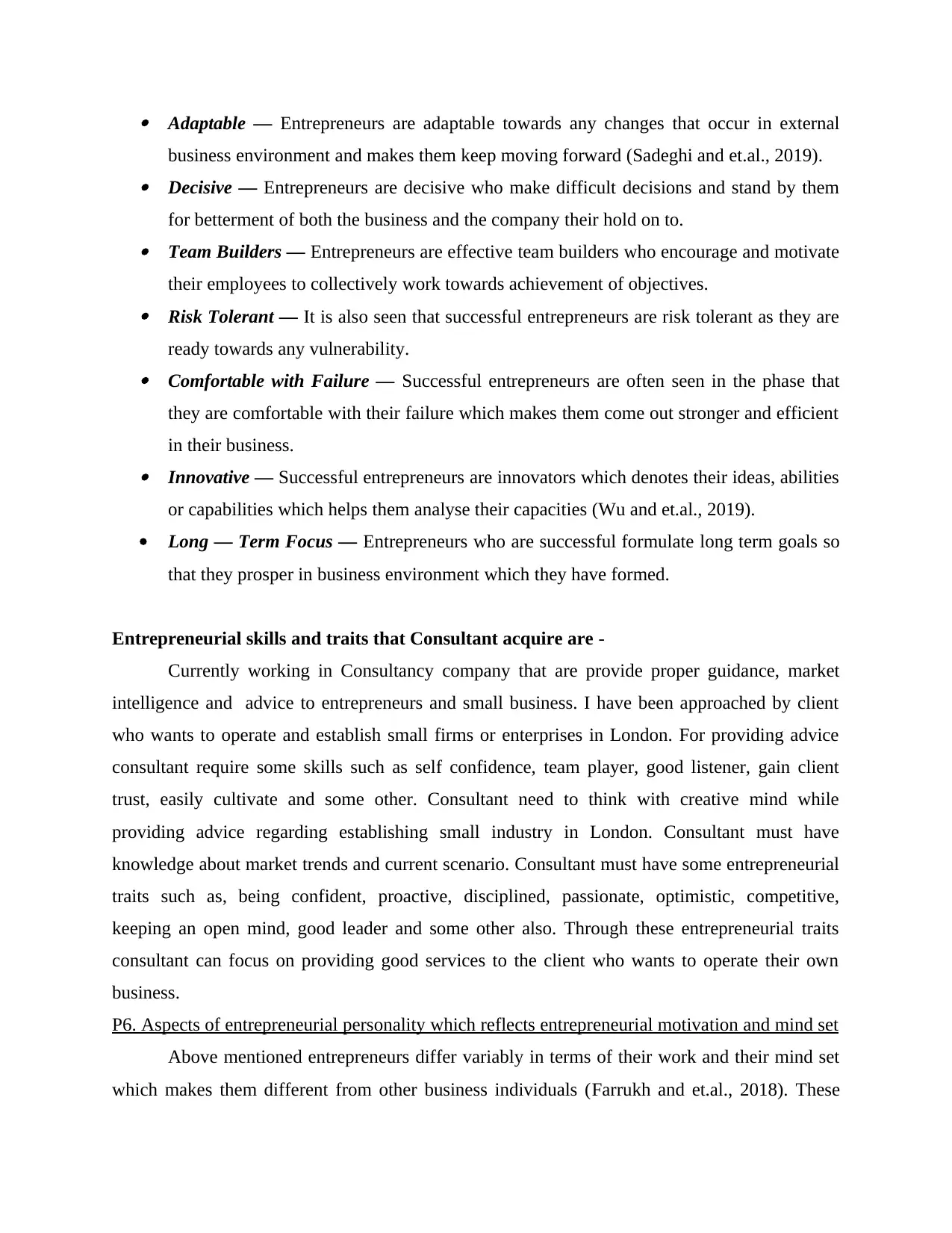
Adaptable — Entrepreneurs are adaptable towards any changes that occur in external
business environment and makes them keep moving forward (Sadeghi and et.al., 2019). Decisive — Entrepreneurs are decisive who make difficult decisions and stand by them
for betterment of both the business and the company their hold on to. Team Builders — Entrepreneurs are effective team builders who encourage and motivate
their employees to collectively work towards achievement of objectives. Risk Tolerant — It is also seen that successful entrepreneurs are risk tolerant as they are
ready towards any vulnerability. Comfortable with Failure — Successful entrepreneurs are often seen in the phase that
they are comfortable with their failure which makes them come out stronger and efficient
in their business. Innovative — Successful entrepreneurs are innovators which denotes their ideas, abilities
or capabilities which helps them analyse their capacities (Wu and et.al., 2019).
Long — Term Focus — Entrepreneurs who are successful formulate long term goals so
that they prosper in business environment which they have formed.
Entrepreneurial skills and traits that Consultant acquire are -
Currently working in Consultancy company that are provide proper guidance, market
intelligence and advice to entrepreneurs and small business. I have been approached by client
who wants to operate and establish small firms or enterprises in London. For providing advice
consultant require some skills such as self confidence, team player, good listener, gain client
trust, easily cultivate and some other. Consultant need to think with creative mind while
providing advice regarding establishing small industry in London. Consultant must have
knowledge about market trends and current scenario. Consultant must have some entrepreneurial
traits such as, being confident, proactive, disciplined, passionate, optimistic, competitive,
keeping an open mind, good leader and some other also. Through these entrepreneurial traits
consultant can focus on providing good services to the client who wants to operate their own
business.
P6. Aspects of entrepreneurial personality which reflects entrepreneurial motivation and mind set
Above mentioned entrepreneurs differ variably in terms of their work and their mind set
which makes them different from other business individuals (Farrukh and et.al., 2018). These
business environment and makes them keep moving forward (Sadeghi and et.al., 2019). Decisive — Entrepreneurs are decisive who make difficult decisions and stand by them
for betterment of both the business and the company their hold on to. Team Builders — Entrepreneurs are effective team builders who encourage and motivate
their employees to collectively work towards achievement of objectives. Risk Tolerant — It is also seen that successful entrepreneurs are risk tolerant as they are
ready towards any vulnerability. Comfortable with Failure — Successful entrepreneurs are often seen in the phase that
they are comfortable with their failure which makes them come out stronger and efficient
in their business. Innovative — Successful entrepreneurs are innovators which denotes their ideas, abilities
or capabilities which helps them analyse their capacities (Wu and et.al., 2019).
Long — Term Focus — Entrepreneurs who are successful formulate long term goals so
that they prosper in business environment which they have formed.
Entrepreneurial skills and traits that Consultant acquire are -
Currently working in Consultancy company that are provide proper guidance, market
intelligence and advice to entrepreneurs and small business. I have been approached by client
who wants to operate and establish small firms or enterprises in London. For providing advice
consultant require some skills such as self confidence, team player, good listener, gain client
trust, easily cultivate and some other. Consultant need to think with creative mind while
providing advice regarding establishing small industry in London. Consultant must have
knowledge about market trends and current scenario. Consultant must have some entrepreneurial
traits such as, being confident, proactive, disciplined, passionate, optimistic, competitive,
keeping an open mind, good leader and some other also. Through these entrepreneurial traits
consultant can focus on providing good services to the client who wants to operate their own
business.
P6. Aspects of entrepreneurial personality which reflects entrepreneurial motivation and mind set
Above mentioned entrepreneurs differ variably in terms of their work and their mind set
which makes them different from other business individuals (Farrukh and et.al., 2018). These
⊘ This is a preview!⊘
Do you want full access?
Subscribe today to unlock all pages.

Trusted by 1+ million students worldwide
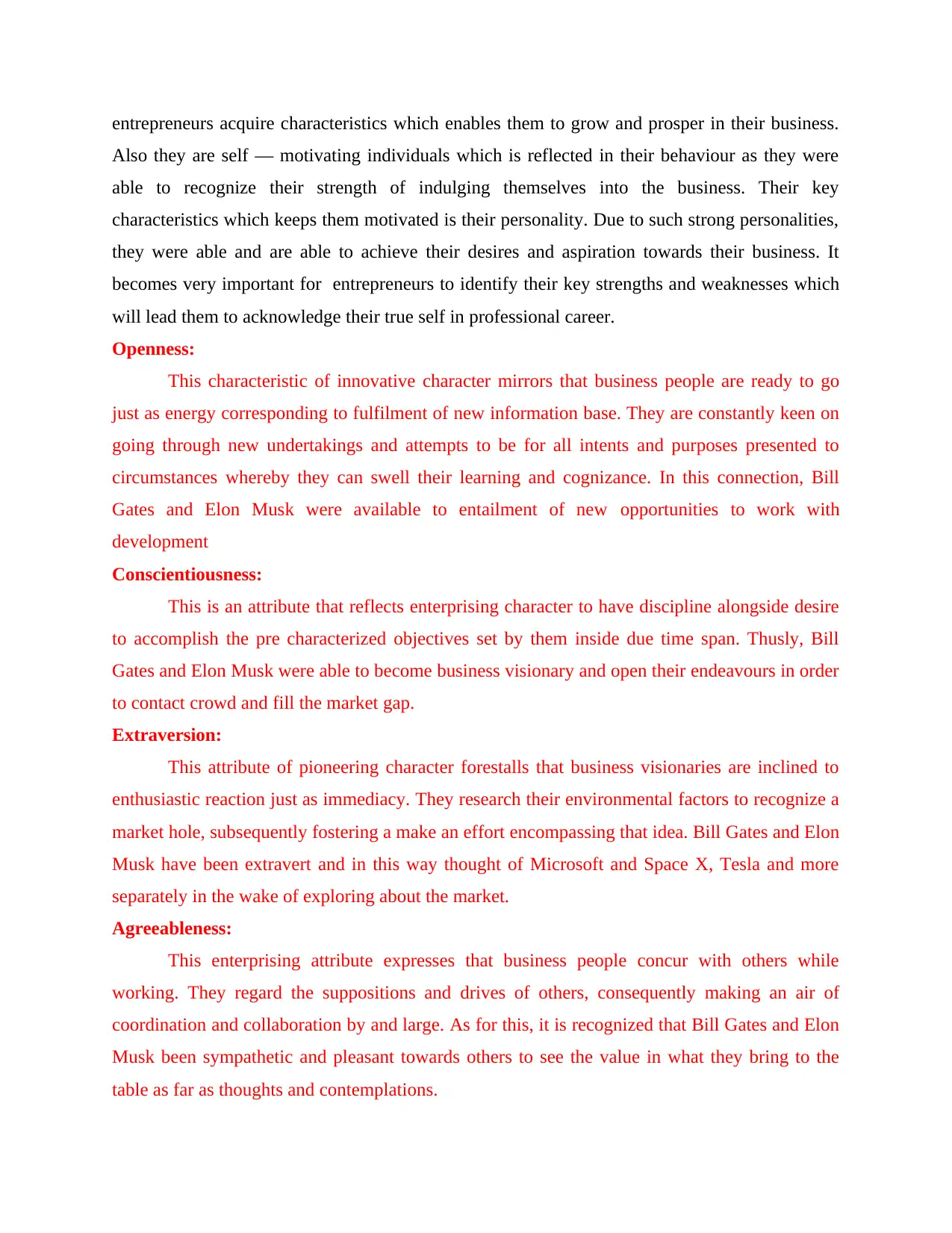
entrepreneurs acquire characteristics which enables them to grow and prosper in their business.
Also they are self — motivating individuals which is reflected in their behaviour as they were
able to recognize their strength of indulging themselves into the business. Their key
characteristics which keeps them motivated is their personality. Due to such strong personalities,
they were able and are able to achieve their desires and aspiration towards their business. It
becomes very important for entrepreneurs to identify their key strengths and weaknesses which
will lead them to acknowledge their true self in professional career.
Openness:
This characteristic of innovative character mirrors that business people are ready to go
just as energy corresponding to fulfilment of new information base. They are constantly keen on
going through new undertakings and attempts to be for all intents and purposes presented to
circumstances whereby they can swell their learning and cognizance. In this connection, Bill
Gates and Elon Musk were available to entailment of new opportunities to work with
development
Conscientiousness:
This is an attribute that reflects enterprising character to have discipline alongside desire
to accomplish the pre characterized objectives set by them inside due time span. Thusly, Bill
Gates and Elon Musk were able to become business visionary and open their endeavours in order
to contact crowd and fill the market gap.
Extraversion:
This attribute of pioneering character forestalls that business visionaries are inclined to
enthusiastic reaction just as immediacy. They research their environmental factors to recognize a
market hole, subsequently fostering a make an effort encompassing that idea. Bill Gates and Elon
Musk have been extravert and in this way thought of Microsoft and Space X, Tesla and more
separately in the wake of exploring about the market.
Agreeableness:
This enterprising attribute expresses that business people concur with others while
working. They regard the suppositions and drives of others, consequently making an air of
coordination and collaboration by and large. As for this, it is recognized that Bill Gates and Elon
Musk been sympathetic and pleasant towards others to see the value in what they bring to the
table as far as thoughts and contemplations.
Also they are self — motivating individuals which is reflected in their behaviour as they were
able to recognize their strength of indulging themselves into the business. Their key
characteristics which keeps them motivated is their personality. Due to such strong personalities,
they were able and are able to achieve their desires and aspiration towards their business. It
becomes very important for entrepreneurs to identify their key strengths and weaknesses which
will lead them to acknowledge their true self in professional career.
Openness:
This characteristic of innovative character mirrors that business people are ready to go
just as energy corresponding to fulfilment of new information base. They are constantly keen on
going through new undertakings and attempts to be for all intents and purposes presented to
circumstances whereby they can swell their learning and cognizance. In this connection, Bill
Gates and Elon Musk were available to entailment of new opportunities to work with
development
Conscientiousness:
This is an attribute that reflects enterprising character to have discipline alongside desire
to accomplish the pre characterized objectives set by them inside due time span. Thusly, Bill
Gates and Elon Musk were able to become business visionary and open their endeavours in order
to contact crowd and fill the market gap.
Extraversion:
This attribute of pioneering character forestalls that business visionaries are inclined to
enthusiastic reaction just as immediacy. They research their environmental factors to recognize a
market hole, subsequently fostering a make an effort encompassing that idea. Bill Gates and Elon
Musk have been extravert and in this way thought of Microsoft and Space X, Tesla and more
separately in the wake of exploring about the market.
Agreeableness:
This enterprising attribute expresses that business people concur with others while
working. They regard the suppositions and drives of others, consequently making an air of
coordination and collaboration by and large. As for this, it is recognized that Bill Gates and Elon
Musk been sympathetic and pleasant towards others to see the value in what they bring to the
table as far as thoughts and contemplations.
Paraphrase This Document
Need a fresh take? Get an instant paraphrase of this document with our AI Paraphraser
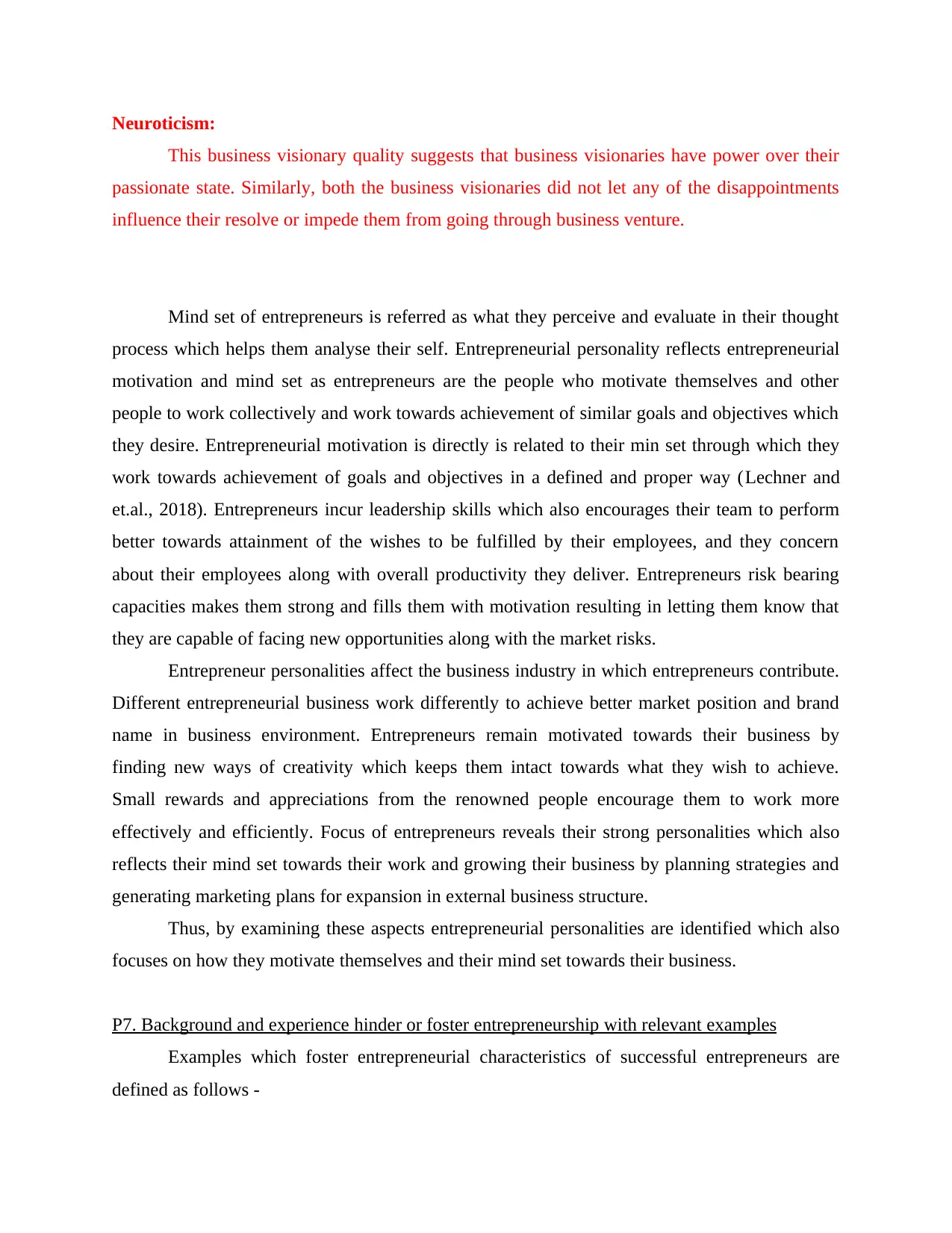
Neuroticism:
This business visionary quality suggests that business visionaries have power over their
passionate state. Similarly, both the business visionaries did not let any of the disappointments
influence their resolve or impede them from going through business venture.
Mind set of entrepreneurs is referred as what they perceive and evaluate in their thought
process which helps them analyse their self. Entrepreneurial personality reflects entrepreneurial
motivation and mind set as entrepreneurs are the people who motivate themselves and other
people to work collectively and work towards achievement of similar goals and objectives which
they desire. Entrepreneurial motivation is directly is related to their min set through which they
work towards achievement of goals and objectives in a defined and proper way (Lechner and
et.al., 2018). Entrepreneurs incur leadership skills which also encourages their team to perform
better towards attainment of the wishes to be fulfilled by their employees, and they concern
about their employees along with overall productivity they deliver. Entrepreneurs risk bearing
capacities makes them strong and fills them with motivation resulting in letting them know that
they are capable of facing new opportunities along with the market risks.
Entrepreneur personalities affect the business industry in which entrepreneurs contribute.
Different entrepreneurial business work differently to achieve better market position and brand
name in business environment. Entrepreneurs remain motivated towards their business by
finding new ways of creativity which keeps them intact towards what they wish to achieve.
Small rewards and appreciations from the renowned people encourage them to work more
effectively and efficiently. Focus of entrepreneurs reveals their strong personalities which also
reflects their mind set towards their work and growing their business by planning strategies and
generating marketing plans for expansion in external business structure.
Thus, by examining these aspects entrepreneurial personalities are identified which also
focuses on how they motivate themselves and their mind set towards their business.
P7. Background and experience hinder or foster entrepreneurship with relevant examples
Examples which foster entrepreneurial characteristics of successful entrepreneurs are
defined as follows -
This business visionary quality suggests that business visionaries have power over their
passionate state. Similarly, both the business visionaries did not let any of the disappointments
influence their resolve or impede them from going through business venture.
Mind set of entrepreneurs is referred as what they perceive and evaluate in their thought
process which helps them analyse their self. Entrepreneurial personality reflects entrepreneurial
motivation and mind set as entrepreneurs are the people who motivate themselves and other
people to work collectively and work towards achievement of similar goals and objectives which
they desire. Entrepreneurial motivation is directly is related to their min set through which they
work towards achievement of goals and objectives in a defined and proper way (Lechner and
et.al., 2018). Entrepreneurs incur leadership skills which also encourages their team to perform
better towards attainment of the wishes to be fulfilled by their employees, and they concern
about their employees along with overall productivity they deliver. Entrepreneurs risk bearing
capacities makes them strong and fills them with motivation resulting in letting them know that
they are capable of facing new opportunities along with the market risks.
Entrepreneur personalities affect the business industry in which entrepreneurs contribute.
Different entrepreneurial business work differently to achieve better market position and brand
name in business environment. Entrepreneurs remain motivated towards their business by
finding new ways of creativity which keeps them intact towards what they wish to achieve.
Small rewards and appreciations from the renowned people encourage them to work more
effectively and efficiently. Focus of entrepreneurs reveals their strong personalities which also
reflects their mind set towards their work and growing their business by planning strategies and
generating marketing plans for expansion in external business structure.
Thus, by examining these aspects entrepreneurial personalities are identified which also
focuses on how they motivate themselves and their mind set towards their business.
P7. Background and experience hinder or foster entrepreneurship with relevant examples
Examples which foster entrepreneurial characteristics of successful entrepreneurs are
defined as follows -
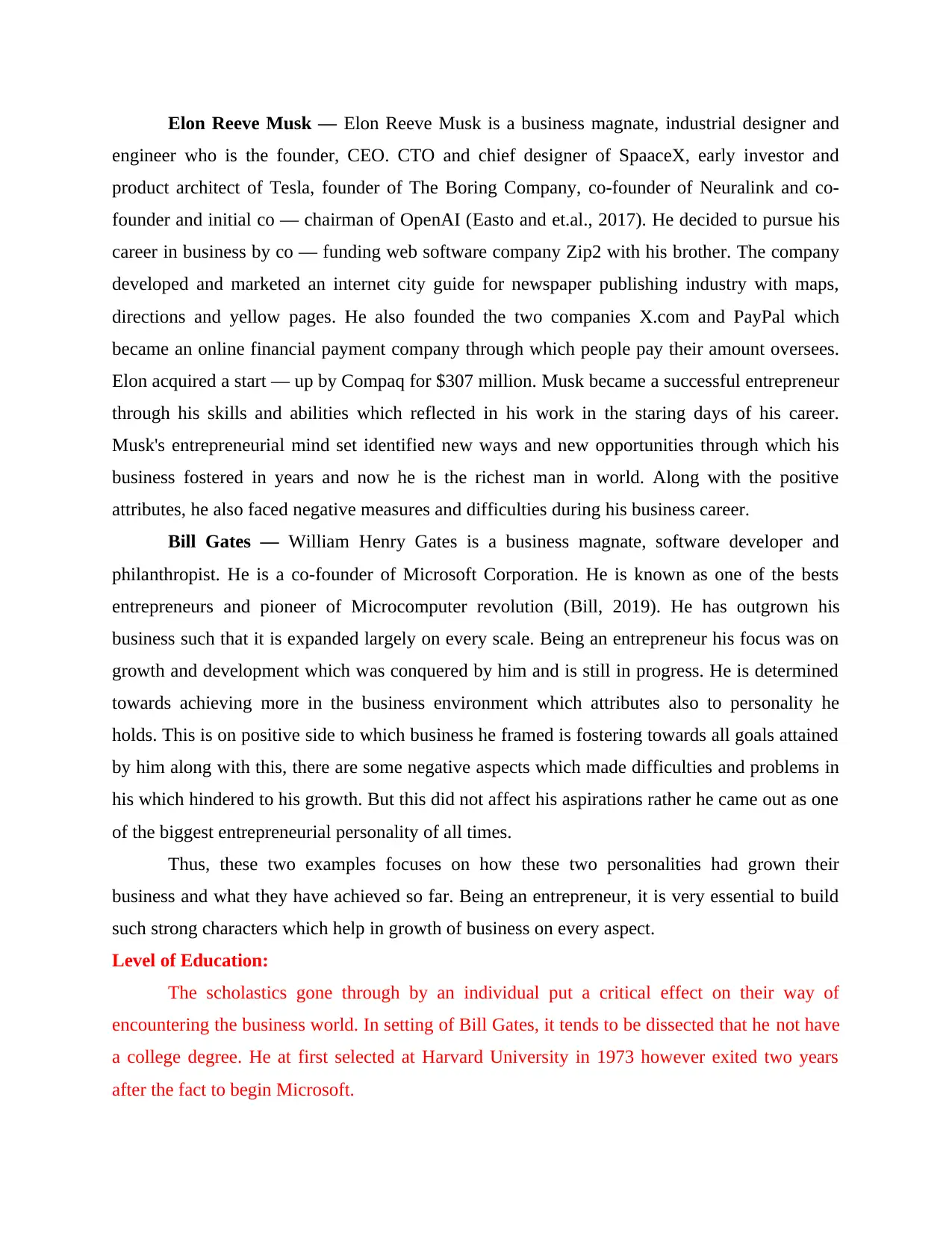
Elon Reeve Musk — Elon Reeve Musk is a business magnate, industrial designer and
engineer who is the founder, CEO. CTO and chief designer of SpaaceX, early investor and
product architect of Tesla, founder of The Boring Company, co-founder of Neuralink and co-
founder and initial co — chairman of OpenAI (Easto and et.al., 2017). He decided to pursue his
career in business by co — funding web software company Zip2 with his brother. The company
developed and marketed an internet city guide for newspaper publishing industry with maps,
directions and yellow pages. He also founded the two companies X.com and PayPal which
became an online financial payment company through which people pay their amount oversees.
Elon acquired a start — up by Compaq for $307 million. Musk became a successful entrepreneur
through his skills and abilities which reflected in his work in the staring days of his career.
Musk's entrepreneurial mind set identified new ways and new opportunities through which his
business fostered in years and now he is the richest man in world. Along with the positive
attributes, he also faced negative measures and difficulties during his business career.
Bill Gates — William Henry Gates is a business magnate, software developer and
philanthropist. He is a co-founder of Microsoft Corporation. He is known as one of the bests
entrepreneurs and pioneer of Microcomputer revolution (Bill, 2019). He has outgrown his
business such that it is expanded largely on every scale. Being an entrepreneur his focus was on
growth and development which was conquered by him and is still in progress. He is determined
towards achieving more in the business environment which attributes also to personality he
holds. This is on positive side to which business he framed is fostering towards all goals attained
by him along with this, there are some negative aspects which made difficulties and problems in
his which hindered to his growth. But this did not affect his aspirations rather he came out as one
of the biggest entrepreneurial personality of all times.
Thus, these two examples focuses on how these two personalities had grown their
business and what they have achieved so far. Being an entrepreneur, it is very essential to build
such strong characters which help in growth of business on every aspect.
Level of Education:
The scholastics gone through by an individual put a critical effect on their way of
encountering the business world. In setting of Bill Gates, it tends to be dissected that he not have
a college degree. He at first selected at Harvard University in 1973 however exited two years
after the fact to begin Microsoft.
engineer who is the founder, CEO. CTO and chief designer of SpaaceX, early investor and
product architect of Tesla, founder of The Boring Company, co-founder of Neuralink and co-
founder and initial co — chairman of OpenAI (Easto and et.al., 2017). He decided to pursue his
career in business by co — funding web software company Zip2 with his brother. The company
developed and marketed an internet city guide for newspaper publishing industry with maps,
directions and yellow pages. He also founded the two companies X.com and PayPal which
became an online financial payment company through which people pay their amount oversees.
Elon acquired a start — up by Compaq for $307 million. Musk became a successful entrepreneur
through his skills and abilities which reflected in his work in the staring days of his career.
Musk's entrepreneurial mind set identified new ways and new opportunities through which his
business fostered in years and now he is the richest man in world. Along with the positive
attributes, he also faced negative measures and difficulties during his business career.
Bill Gates — William Henry Gates is a business magnate, software developer and
philanthropist. He is a co-founder of Microsoft Corporation. He is known as one of the bests
entrepreneurs and pioneer of Microcomputer revolution (Bill, 2019). He has outgrown his
business such that it is expanded largely on every scale. Being an entrepreneur his focus was on
growth and development which was conquered by him and is still in progress. He is determined
towards achieving more in the business environment which attributes also to personality he
holds. This is on positive side to which business he framed is fostering towards all goals attained
by him along with this, there are some negative aspects which made difficulties and problems in
his which hindered to his growth. But this did not affect his aspirations rather he came out as one
of the biggest entrepreneurial personality of all times.
Thus, these two examples focuses on how these two personalities had grown their
business and what they have achieved so far. Being an entrepreneur, it is very essential to build
such strong characters which help in growth of business on every aspect.
Level of Education:
The scholastics gone through by an individual put a critical effect on their way of
encountering the business world. In setting of Bill Gates, it tends to be dissected that he not have
a college degree. He at first selected at Harvard University in 1973 however exited two years
after the fact to begin Microsoft.
⊘ This is a preview!⊘
Do you want full access?
Subscribe today to unlock all pages.

Trusted by 1+ million students worldwide
1 out of 16
Related Documents
Your All-in-One AI-Powered Toolkit for Academic Success.
+13062052269
info@desklib.com
Available 24*7 on WhatsApp / Email
![[object Object]](/_next/static/media/star-bottom.7253800d.svg)
Unlock your academic potential
Copyright © 2020–2026 A2Z Services. All Rights Reserved. Developed and managed by ZUCOL.




